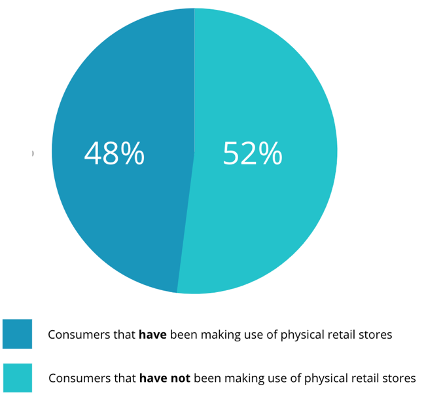Introduction
With the booming of e-commerce and in the recent decade, digital transformation has established itself as the “rulers of the game” in the retail and distribution industry. Modern retail consumers have greater expectations than just a normal shopping experience, e-commerce has given consumers the pliability of purchasing any good and/or service at their disposal via virtual platforms.
It has been observed that the consumer usage of e-commerce has risen exponentially with Amazon and eBay being the top performing e-retailers. E-commerce sales are expected to witness an increase of 276.9% globally. In as early as 2000, retailers began to face difficulties in the sustenance of customers due to the emergence of digital technology. This has given rise to the possibility of e-commerce replacing the traditional brick-and-mortar retailers with the surfacing of the “internet retailing revolution”.

What are the new digital business trends in the modern retail environment?
Digital business technologies have developed significantly in the past decade. Alongside this technological advancement the expectations of shoppers have also changed partially due to a millennial’s who are ‘Tech savvy’ becoming an increasingly large demographic group. More consumers are now choosing e-Commerce as their first choice purchasing platform. This has created a dilemma for traditional brick and mortar retailers in deciding how they should remain competitive and create value in their stores to maintain consumer satisfaction. In response to new digital business trends retailers have begun to integrate new technologies into standard shopping experiences. A common trend is QR code tagging on almost every item available on the market, this allows the consumer to access more information about products or services. Another feature piloted by fashion retailers is augmented mirror technology which enables users to try on clothes virtually by simulating the outfit through a mirror. The innovations in this sector are being constantly improved by new developments in app design and changing consumer trends.

1. Executives’ lack of participation
It is vital for executives in their respective companies to demonstrate commitment, engagement and passion for projects to be a success. Executives should ensure their team does not settle for paths that seem straightforward solely for the sake of keeping the employees happy with the least amount of workload. Transformation is a long and difficult process; executives play an important role in establishing a corporate culture that is up to the required standards.
2. Starting out with extra ambition
Transformation projects require the establishment of progression which can only be achieved with time. It is best for the minimum viable product to be prepared for launch in order to avoid possibilities of errors and constant changes needed to be made and approved by management, or in most distant, leading to project cancellations. On the contrary, it is equally as important for any new ideas to be shared amongst the team for possible developments of the idea into a potential project.
3. Attached to the past
It is essential that teams learn to adapt to the new tools introduced via digital technology in order to progress with future projects before they launch, efficient and effective training should take place for all teams working in the digital transformation department. Using previous traditional methods such as reviewing changes via a formal approval board will not be as successful as the aforementioned methods for the success of the digital initiative.
4. Selecting vendors and not partners
Technology should not be a hindrance for any business wanting to experiment with new launches. If businesses are not able to achieve the optimum performance from the tools, then they are likely to be working with vendors rather than partners. It is indispensable that partners are included as part of the transformation process and team as they are part of the building team and integral to the process.
5. Placing importance on skill sets instead of strategy whilst hiring
It is imperative that the correct people are hired for the transformation process as it is critical for the success of the future projects. A detailed resume with a number of relevant applications does not necessarily demonstrate a candidate’s transformation creativity. Strategic advisors are an impeccable asset to possess in one’s business as they will not only lead the business towards revenue growth, but they will also ensure to inaugurate a unique customer experience by manifesting a customer focused approach.
What impact has COVID-19 on retail businesses and how has digital business technologies supported retailers?

COVID-19 forced retailers to adapt their operations to fit the business need during a pandemic. Brick and mortar doors were forced close their doors due to lockdowns held worldwide which meant that those which did not have a digital platform were essentially unable to trade. In the modern environment, very few retailers do not operate within a digital environment, however, there are some businesses which solely focus on a brick-and-mortar experience. Businesses which have previously invested in their e-commerce profile experienced less of an impact from COVID-19 because of their multi-channel sales and distribution systems which does not rely on a physical location to operate.
It has been found that 52% of consumers have not been making use of physical retail stores during the pandemic and 38% refuse to return to physical stores for their shopping until the vaccine is released. The aforementioned is an implication on the indirect demand of e-commerce and digital technologies for future purchases.

How can the J7 Network help your company improve your digital business experience?
There are now new businesses opening everyday which provide a service in digital transformation for businesses to adapt to the modern business environment. J7 comprises of 7 Junior-Enterprises with 300 interdisciplinary students from all across Europe. J7 provides business consulting in indispensable areas for a business namely: CSR, strategy, marketing, IT and engineering. J7 has reached and achieved numerous milestones having completed over 1500 projects for more than 1000 clients, and we continue to serve our clients during these unprecedented times. The presence of our international network allows for the quintessential collaboration with the use of digital technologies to offer our clients with our exemplary services.

